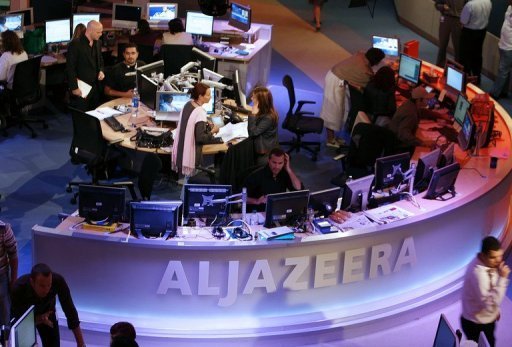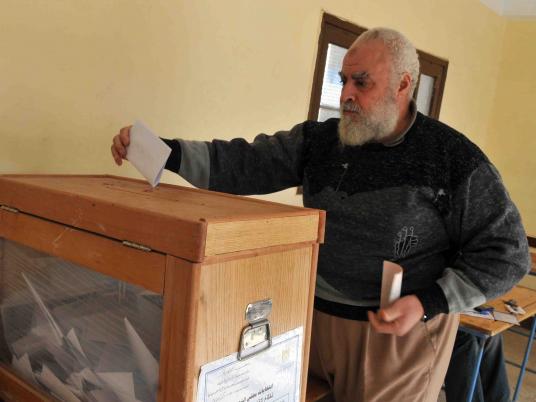The fall of Hosni Mubarak has triggered a rush by political parties and foreign organizations to use opinion polling to gauge the mind of the nation in the run-up to parliamentary and presidential elections this year.
Prior to the 25 January revolution it had been impossible to collect political information from voters due to tight government restrictions, but since the toppling of Mubarak companies have been making requests for hard data about which way the political wind might be blowing.
“People want to know the mind of the nation,” said Steve Spicer, a Cairo-based research manager from French opinion polling company Ipsos. “Everybody wants to know what people are thinking because people’s opinions now have weight.
“Before it didn’t matter because of the way the country was ruled.”
Since first arriving in 2006, Ipsos has focused on collecting consumer data for advertising and product testing. But Spicer said that since the revolution Ipsos has received a number of requests from Egyptian newspapers and political parties as well as organizations in the US to carry out opinion polling on their behalf.
He said he could not reveal who had made requests to Ipsos, but added that the company was expanding its focus on politics and public affairs as a result of the newfound interest.
“Before, if you did any sort of research here you needed to get the subject matter approved by the government. If you wanted to ask political questions they would refuse.”
Other major polling companies are also making hay.
YouGovSiraj, a market research organization based in Dubai, which specializes in collecting data from across the Middle East, said that since February it had been approached by one presidential contender and a leading Egyptian TV station to carry out political surveys.
Paul Marshall, the company’s research director, said: “We have carried out numerous commercial projects for clients over the years, but as you would expect the changes across the region have led to an increase in interest for social and political projects.”
Only four days after Mubarak fell, YouGovSiraj conducted its first poll in a survey of 2000 people, asking what he nation expected of its new government. Some of the results were unsurprising; given the disintegration of order during the 25 January uprising it is little wonder that 74 percent of those asked ranked “political stability” as the main desire.
Others were more intriguing. A mere eight per cent of female respondents ranked women’s rights as one of their two top priorities, while freedom of expression was a pressing concern for only a quarter of those asked.
A second survey was conducted last month. The poll asked for people’s opinions on who should be president. Amr Mousa was the most popular choice, but at 25 per cent he was 24 points down on the February survey.
It also quizzed respondents on what role Islam should play in the future of Egypt. A quarter of Egyptians wanted an “Islamic state” governed according to the Quran, but 57 percent said they wanted Islamic law to be just “one source of several sources” for the constitution.
According to Holger Albrecht, an assistant professor of political science at the American University in Cairo (AUC), the new focus on political opinion polling is well overdue.
“I’m very aware of the lack of good data in Egypt,” he said. “It’s one of the major problems we have in doing research. We want to know how strong the Muslim Brotherhood are, about specific ideologies among Egyptians and how they are going to spread.”
But, as Albrecht points out, conducting rigorous opinion polling is an expensive business. Ahmed Nagui Kamha, who co-ordinates the public opinion polls program at the government-funded Al-Ahram Center for Political and Strategic Studies, said one study can cost up to US$33,500.
Moreover, during the Mubarak era, when elections only ever had one winner, canvassing opinions would have been as pointless as it was impossible under the tight restrictions.
One Cairo-based risk analyst, who did not want to be named, said, “Why would you have done polling? There was no political environment.”
There has not been a total dearth of polling information however. An opinion poll program at the Al-Ahram Center was established in 1997 and now carries out six to eight surveys a year.
“Political polling is very important to understand about Egypt’s political future and the most important problems facing Egypt now,” Ahmed Nagui Kamha said. “How do Egyptian people look at themselves? Towards the world? It’s very important to understand how Egyptian people think about these things.”
There is also the Public Opinion Poll Center, a government-sponsored body that collects data on behalf of the Egyptian cabinet.
But according to Samer Soliman, an assistant professor of political science at AUC, because these organizations are funded by the state there is a pressing need for other firms that are not hamstrung by government ties.
“I’m not saying they are producing false results, but the way they are asking questions might not be free,” he said.
“Polls are very important. We need to know what kind of views people have and what people are interested in.”
Yet times have changed. In the post-Mubarak era a number of organizations are clamoring to take advantage of the newfound spirit of openness.
TNS Global, a Heliopolis-based subsidiary of worldwide marketing company Kantar Group, said it has seen a surge of interest in obtaining political data since the 25 January uprising.
“We’ve had inquiries from Egyptian newspapers, political parties and foreign companies,” said Mohamed Ahmed, TNS Global’s general manager.
“The political parties want to know what’s going on in the country and they want to know if there is a future for them or not. It helps them make their policies.”
Another group that has been set up to facilitate the demand is Thawra Stats, a polling organization that was established in February after the toppling of Hosni Mubarak.
Its co-founder, Seif al-Khawanky, said the company was the only fully Egyptian, fully independent organization carrying out political opinion polling at the moment.
He said that other organizations “are not doing polling for the sake of polling,” but mainly doing one-off surveys or studies that are made-to-order for a particular client.
He added that one of the reasons Thawra Stats is different is because it conducts “trend” polling – asking the same questions about voter intentions every two weeks in a bid to establish patterns.
“It’s very important to get a good understanding of Egyptian society,” he added. “We’re going through a very big period and everything is changing, so we should have a set of numbers that is unbiased so we know what is going on.”
The latest project on Thawra’s horizon is to organize exit polls during the next parliamentary elections.
For a country where the outcomes of most polls have usually never been in doubt, Thawra’s project symbolizes how far the political sands in Egypt are shifting.


